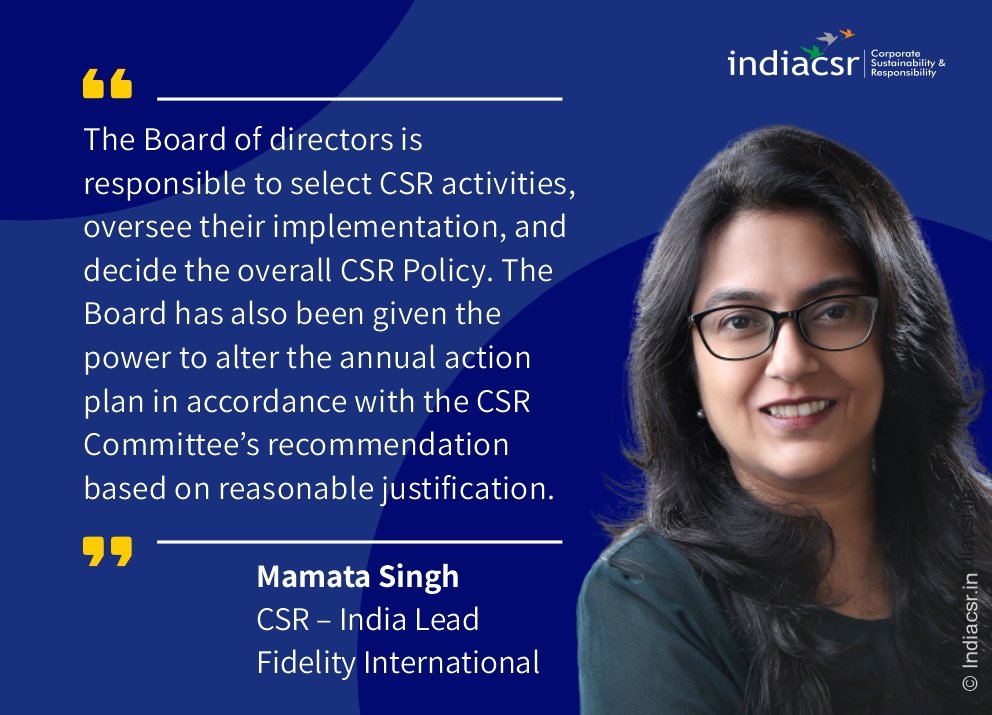By Mamata Singh, CSR – India Lead, Fidelity International
The new CSR rules clearly define what qualifies as CSR activity and what does not.
The COVID-19 pandemic has brought to the fore the impact corporates can have in times of social stress. Companies responded to the crisis during 2020 and 2021 with great urgency, displaying remarkable flexibility and working in tandem with central, state government and local agencies to help with the situation on the ground.
This period has also seen amendments in India’s CSR framework, wherein the government has provided greater clarity on how companies need to approach CSR. On 22nd January 2021, the Ministry of Corporate Affairs issued the Companies (Corporate Social Responsibility Policy) Amendment Rules giving effect to the changes introduced in CSR by the Companies Amendment Acts of 2019 and 2020. This article aims to decode the key changes and their implications for Corporate India.
Changes in definitions
New terms like Administrative Overheads, International Organisation, and Public Authority have been defined, providing greater clarity to companies. As per these definitions, the cap of 5% on administrative overheads applies to expenses incurred by the company for general management and administration of CSR and will cover items such as the company’s CSR team, office supplies, etc. However, it will not apply to costs for designing, implementing, monitoring and evaluating the project, or to the Implementing Agency / NGO partner’s administrative costs.

Further, the new rules clearly define what qualifies as CSR activity and what does not. Specifically, while some COVID-related research and development activities are permitted subject to specific conditions, the rules also clearly note that political donations, activities benefiting employees and sponsorship for activities in order to derive marketing benefits are not permissible.
Further, any activity undertaken by the company outside India is not be allowed. The only exception is for the training of Indian sports personnel representing any State or Union territory at the national level or India at the international level. Activities carried out for the fulfilment of any other statutory obligations under any law in force in India are also not allowed.

However, some areas need further clarity. As an example, ongoing projects are defined as those having a time period of four years. This raises the question of what happens to projects with longer time horizons. Say a project focussed on getting children to complete schooling, which may involve longer time periods. As per current rules, companies may not be able to undertake such projects.
Clarification on implementation
The new Rules also clarify to which type of entities a company can take help from for its CSR implementation. Companies can undertake CSR implementation themselves or through another company established under Section 8 of the Companies Act, a registered public trust, or a registered society established either by the company itself or by the Central or State governments. In addition to the above, any entity established under an Act of Parliament or a State legislature, or a Section 8 company, registered public trust or a registered society, not referred to above but having an established track record of a minimum of three years can also be used for CSR implementation.

All such implementing entities intending to undertake CSR activities are required to register themselves with the Central Government by filing form CSR-1 electronically for all CSR projects effective from 1st April 2021. A unique CSR Registration Number shall be generated for all companies submitting Form CSR-1. This will help the government maintain a database of projects undertaken and provide corporations with a performance record of implementing agencies.
Action plans and Reporting
As per the New Rules, the CSR Committee has been given the task of formulating and recommending to the Board an annual action plan in pursuance of its CSR policy. The Board of directors is responsible to select CSR activities, oversee their implementation, and decide the overall CSR Policy. The Board has also been given the power to alter the annual action plan in accordance with the CSR Committee’s recommendation based on reasonable justification.

Action plans need to include the list of CSR projects to be undertaken, the manner of execution of such projects, modalities of utilisation of funds and implementation schedules, monitoring and reporting mechanism for the projects, and details of need and impact assessment, if any, for the projects undertaken. This makes roles and responsibilities for corporates quite clear and should help with planning activities related to CSR.
The Rules now also require companies having an average CSR obligation of Rupees Ten crore or more in three immediately preceding financial years to undertake an impact assessment of their CSR projects through an independent agency. The Rules also allow companies to claim 5% of total CSR expenditure of Rupees Fifty lakh, whichever is less, as a CSR Expenditure.

Overall, these changes have led to enhanced clarity for companies. Moreover, the targeted focus on impact assessment is promising and can bring a significant change in the way corporations assess CSR contribution. However, companies will have to be mindful that their CSR budgets are allocated well in advance of the year-end so that partners can utilise the amount fully.

Any unspent or unallocated funds at the end of the fiscal year will need to be transferred to funds specified by the government, leaving companies unable to have any visibility on how they are spent. In the case of ongoing projects also, disbursements will need to be staggered to ensure partners can utilise whatever amounts are disbursed to them within the fiscal year. Anything above that will need to be transferred to the Unspent CSR Account of the company and can be disbursed to the Implementing Agency as required for the Ongoing Project.
(Mamata Singh, CSR – India Lead, Fidelity International)
(CopyRight@India CSR)



















